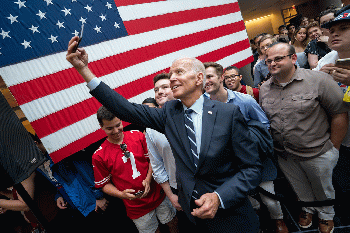
CUNY Foreign Policy Speech - New York, NY - July 11, 2019
(Image by Biden For President from flickr) Details DMCA
The most pressing threat to global security right now isn't so-called "provocations" by either Russia or China. It is the United States' misplaced obsession with its own "credibility".
This rallying cry by Washington officials - echoed by the media and allies in London and elsewhere - is code for allowing the US to act like a global gangster while claiming to be the world's policeman. US "credibility" was apparently thrown into question last summer - and only when President Joe Biden held firm to a pledge to pull US troops out of Afghanistan.
Prominent critics, including in the Pentagon, objected that any troop withdrawal would both suggest the US was backing off from a commitment to maintain the so-called "international order" and further embolden the West's "enemies" - from the Taliban and Islamic State (IS) group to Russia and China.
In a postmortem in September, General Mark Milley, chairman of the joint chiefs of staff, echoed a view common in Washington: "I think that our credibility with allies and partners around the world, and with adversaries, is being intensely reviewed by them to see which way this is going to go - and I think that damage is one word that could be used."
At the same time, a former defence official in the George W Bush administration judged US credibility after the Afghanistan withdrawal at "rock bottom".
The only way this understanding of US "credibility" makes sense is if one disregards the disastrous previous two decades of Washington's role in Afghanistan. Those were the years in which the US army propped up a bunch of wildly unpopular kleptocrats in Kabul who ransacked the public coffers as the US launched an arms' length drone war that ended up killing large numbers of Afghan civilians.
To bolster its apparently diminished "credibility" after the troop withdrawal, the US has imposed crushing sanctions on Afghanistan, deepening its current famine. There have also been reports of CIA efforts to run covert operations against the Taliban by aiding its opponents.
Cold War RelicWashington's "credibility" was also seemingly in peril when US and Russian officials met in Geneva this week for negotiations in the midst of a diplomatic, and potential military, standoff over Ukraine.
The background are demands from Moscow that Washington stops encircling Russia with military bases and that Nato end its relentless advancement towards Russia's borders. Nato should be a relic of a Cold War-era that officially ended with the collapse of the Soviet Union in late 1991. Moscow dissolved its own version of Nato, the Warsaw Pact, more than three decades ago.
Russia had been given verbal assurances in 1990 by George HW Bush's administration that Nato would not expand militarily beyond the borders of what was then West Germany. Seven years later, President Bill Clinton signed the Nato-Russia Founding Act on Mutual Relations, which committed Russia and Nato not to treat each other "as adversaries", while Nato reiterated that there would be no "additional permanent stationing of substantial combat forces" in former Eastern bloc states.
Every subsequent US administration has flagrantly broken both of these pledges, with Nato troops now stationed across eastern Europe. Perhaps not surprisingly, Moscow feels as menaced by Nato's aggressive posturing, which serves to revive its Cold War fears, as Washington would if Russia placed military bases in Cuba and Mexico.
No one should forget that the US was prepared to bring the world to the brink of armageddon in a nuclear standoff with the Soviet Union in 1962 to prevent Moscow from stationing nuclear missiles in Cuba.
Historic AllianceDespite the current clamour about the need for the US to maintain its "credibility", Washington was in fact only being asked at the Geneva talks to start honouring, 30 years late, commitments it made long ago and has repeatedly violated.
The latest flashpoint is Ukraine, Russia's neighbour, which has been roiling since a coup in 2014 overthrew the elected president, Viktor Yanukovych, an ally of Moscow. The deeply divided country is split between those who want to prioritise their historic ties with Russia and those who want to be embraced by the European Union.
(Note: You can view every article as one long page if you sign up as an Advocate Member, or higher).





